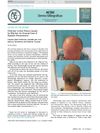TLDR Some people with Frontal Fibrosing Alopecia may be allergic to a common sunscreen ingredient.
The document presents a study investigating the potential link between Frontal Fibrosing Alopecia (FFA) and sensitization to ethylhexyl salicylate (EHS), a common ingredient in sunscreens and cosmetics. The study involved 33 FFA patients, with 27.3% showing positive reactions to EHS. The study also reviewed 12 cases of EHS sensitization and evaluated 518 dermo-cosmetic products, finding EHS in 14.7% of them. The authors suggest that EHS could be a potential allergen contributing to FFA and recommend further investigation. They also speculate that high exposure to sunscreens could lead to a higher risk of contact sensitization to their ingredients, but whether this can impact the pathogenesis of FFA remains speculative.
 23 citations
,
April 2021 in “Journal of Clinical Medicine”
23 citations
,
April 2021 in “Journal of Clinical Medicine” Frontal Fibrosing Alopecia's cause is unclear, affects mainly postmenopausal women, and current treatments focus on stopping hair loss rather than regrowth.
35 citations
,
January 2020 in “Journal of the American Academy of Dermatology” Avoiding certain allergens in personal care products may improve symptoms for some patients with lichen planopilaris or frontal fibrosing alopecia.
 26 citations
,
October 2018 in “British Journal of Dermatology”
26 citations
,
October 2018 in “British Journal of Dermatology” Regular use of sunscreen may be linked to frontal fibrosing alopecia.
5 citations
,
July 2018 in “Skin appendage disorders” Sunscreen spray on the scalp may be linked to a type of scarring hair loss.
24 citations
,
July 2018 in “British Journal of Dermatology” Contact allergies might contribute to frontal fibrosing alopecia.

The article suggests that patients with Frontal Fibrosing Alopecia may have more contact allergies, but it doesn't prove that allergies cause the condition.
January 2024 in “Updates in clinical dermatology” Frontal fibrosing alopecia is a scarring hair loss condition mainly affecting postmenopausal women, with unclear causes.
 1 citations
,
April 2016 in “Actas Dermo-Sifiliográficas”
1 citations
,
April 2016 in “Actas Dermo-Sifiliográficas” Wearing a wig caused a woman's skin condition to worsen due to pressure from the wig's fasteners.
 June 2025 in “Journal of Cluster Science”
June 2025 in “Journal of Cluster Science” Metal nanoparticles show promise for treating hair loss but need more research to ensure safety.
 October 2025 in “International Journal of Women’s Dermatology”
October 2025 in “International Journal of Women’s Dermatology” Many women's hair growth products contain harmful ingredients, but eco-friendly options are available.








